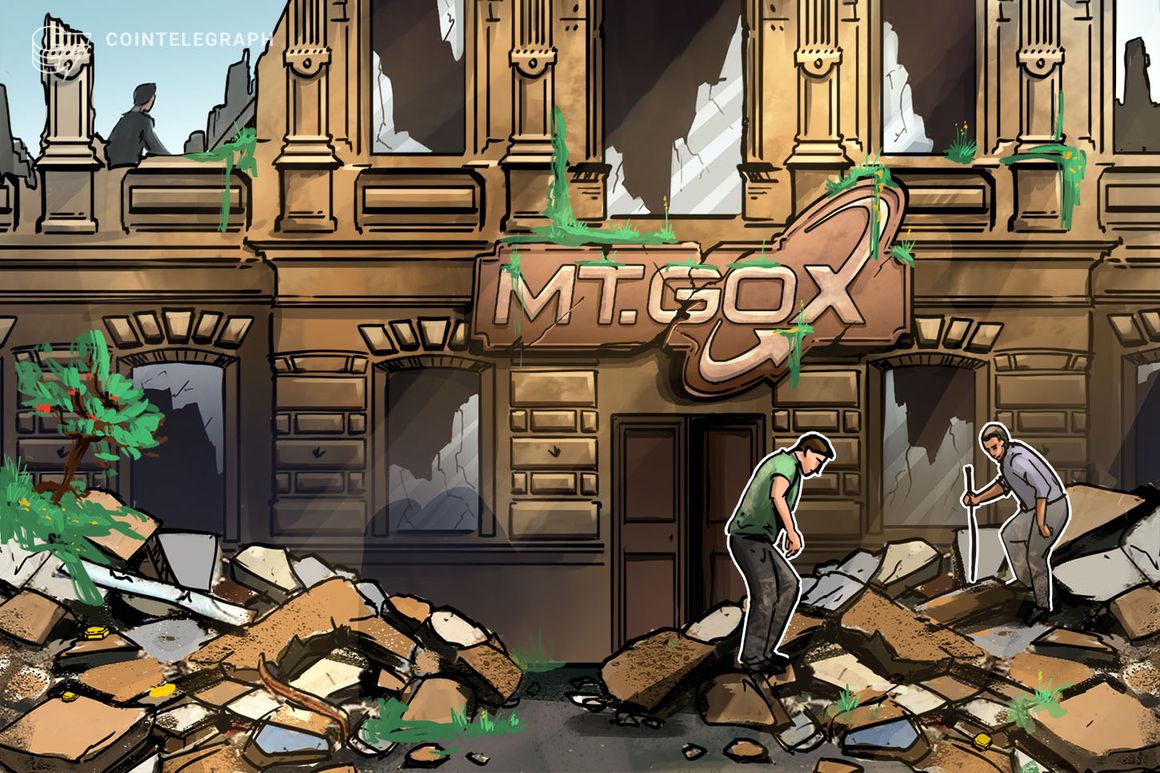Mt. Gox’s infamous 2014 security breach — that lost 850,000 Bitcoin (BTC) of investors’ funds — resulted in its users embarking on a seemingly never-e
Mt. Gox’s infamous 2014 security breach — that lost 850,000 Bitcoin (BTC) of investors’ funds — resulted in its users embarking on a seemingly never-ending, decade-long pursuit of closure via funds reimbursement.
Over the years, Mt. Gox has backtracked on its numerous plans to reimburse the funds that the crypto exchange had barred its users from withdrawing — effective from Feb 25, 2014.

However, with Mt. Gox postponing its repayment deadlines by one more year, from Oct. 31, 2023, to Oct. 31, 2024, the wait for redressal extends into the 11th year for Mt. Gox investors.
Mt. Gox 2014: The year of the largest Bitcoin hack – (Avg. BTC price $420)
Days after Mt. Gox lost 850,000 BTC in the February 2014 breach, leaked documents revealed that the crypto exchange became insolvent. It read:
“The cold storage has been wiped out due to a leak in the hot wallet. The reality is that MtGox can go bankrupt at any moment, and certainly deserves to as a company.”
It was generally assumed that the fall of Mt. Gox would mean the end for Bitcoin, considering that the exchange managed 70% of the total circulating Bitcoin at the time. Mt. Gox filed for bankruptcy protection in Tokyo District Court, Japan after losing nearly $500,000 in value.
The exchange was soon hit by numerous lawsuits as investors feared the possibility of Mt. Gox’s intention to return investors’ funds. The sentiment of mistrust grew over the year as Mt. Gox revealed no plans for reimbursement while deleting its website and social media presence.
Mt. Gox 2015: Back and forth with Tokyo court (Avg. BTC price $260)
Amid its ongoing bankruptcy proceedings in Tokyo District Court, Mt. Gox CEO Mark Karpelès was arrested without charge for 23 days by the Japanese police for allegedly manipulating the computer system to inflate his account. Authorities found it hard to link criminals to crypto crimes due to the lack of regulations around cryptocurrencies.
On April 22, 2015, Mt. Gox’s bankruptcy trustee, Nobuaki Kobayashi, instructed users to file a claim for their missing Bitcoin via mail or a form that could be accessed with a Mt Gox login and password.
It was believed that Mt. Gox would return around 20% of the users’ funds considering the fall in Bitcoin’s market price.
Mt. Gox 2016: Investors go through the claim process (Avg. BTC price $620)
Mt. Gox revealed that only $91 million in assets were slated to be distributed to claimants. However, not all investors came to terms with Mt. Gox’s alleged plans to reimburse a small portion of funds. As a result, the total claims for reimbursement reached $2.4 trillion even though the loss was around $500,000.
This was also the year when the idea of storing cryptocurrencies in cold wallets got much-needed attention from the crypto community.
After being arrested twice in 2015 under the allegations of embezzlement of $3 million of customers money, Karpelès was released from jail on July 13, 2016, after paying a bail bond of nearly $100,000.
Mt. Gox 2017: Legal struggles and introduction of Karpeles coin (Avg. BTC price $5,000)
Discussions around funds reimbursement were overshadowed by the legal proceedings against former Mt. Gox CEO Karpelès’ involvement in funds embezzlement.
Karpeles admits operating Willy bot, now called an “obligation exchange”, but says it was for good of company so not illegal #KarpelesTrial
— Kolin Burges (@The_K_meister) July 11, 2017
During the trial, Karpelès admitted to operating a so-called ‘Willy Bot’ (obligation exchange). The bot earned its name from Mt. Gox traders concerned about the manipulation of the exchange’s volumes at its peak.
On Nov. 28, 2017, Karpelès introduced his plans to conduct an initial coin offering (ICO) to raise $245 million to “revive” Mt. Gox. However, Karpeles discarded the decision after learning about the legal hurdles around launching an ICO campaign.
Mt. Gox 2018: A slow year for creditors (Avg. BTC price $7,000)
Following a strong price recovery over the past year, on August 1, 2018, Mt. Gox revised its basic policy for preparing a rehabilitation plan. It read:
“Mt. Gox is not capable of returning all BTC deposited by creditors. Accordingly, we consider that all assets of Mt. Gox should be distributed to creditors and not to shareholders.”
At the time, the exchange believed that most of the assets, including approximately 166,000 BTC and 168,000 of Bitcoin Cash (BCH) and other derivatives currently held by Mt. Gox, should be paid to creditors at the time of the first payment.
Despite the ongoing discussion, a resolution was never reached that could satisfy legal and creditors’ requirements.
Mt. Gox 2019: Plan extensions and delays (Avg. BTC price $8,000)
The anticipation for the Mt. Gox was at peak as a rehabilitation plan was seemingly underway.

However, Mt. Gox requested the…
cointelegraph.com

COMMENTS